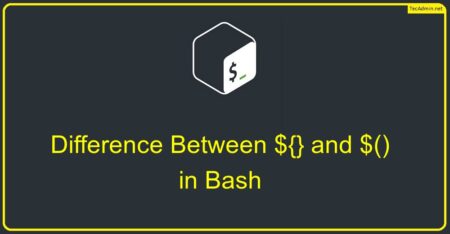Bash, the shell used in most Linux distributions, provides several ways to quote strings. Among these, single quotes (”) and double quotes (“”) are the most commonly used. While they may look similar, they have different behavior and can affect how the shell interprets the contents of the string.
In this article, we will explore the differences between single and double quotes in Bash.
Single Quotes (”)
Single quotes are used to enclose a string in Bash. When a string is enclosed in single quotes, the shell treats the contents of the string as a literal string, without any interpretation. This means that all special characters inside the single quotes are treated as regular characters, and no expansion or substitution takes place.
For example, if we have a string that contains a dollar sign ($), which is a special character in Bash, and we enclose it in single quotes, the dollar sign is treated as a regular character and not expanded. Here’s an example:
1 | echo 'My salary is $1000' |
In this example, the string ‘My salary is $1000’ is enclosed in single quotes. When we run the command, the shell treats the string as a literal string and prints it exactly as it is, without expanding the dollar sign.
Double Quotes (“”)
Double quotes are also used to enclose a string in Bash. When a string is enclosed in double quotes, the shell treats the contents of the string differently than it does with single quotes. Specifically, the shell expands variables and certain special characters inside the double quotes.
For example, if we have a variable $name that contains a value ‘John’, and we enclose it in double quotes, the shell expands the variable and substitutes its value in the string. Here’s an example:
1 2 | name='John' echo "Hello, $name!" |
In this example, the variable $name is enclosed in double quotes. When we run the command, the shell expands the variable and substitutes its value in the string, resulting in the output ‘Hello, John!’.
Double quotes also allow for the use of certain special characters such as backslashes (\) and exclamation marks (!) within the string. These characters can be escaped using a backslash (\) to avoid their special meaning.
For example, if we want to include an exclamation mark in our string, which has a special meaning in Bash, we can escape it with a backslash to avoid its special meaning. Here’s an example:
1 | echo "This is an exclamation mark: \!" |
In this example, the exclamation mark is escaped with a backslash (!) to avoid its special meaning. When we run the command, the shell treats the exclamation mark as a regular character and prints it in the output.
Conclusion
In conclusion, the main difference between single quotes and double quotes in Bash is the way the shell treats the contents of the string. Single quotes treat the contents of the string as a literal string, without any interpretation or substitution, while double quotes allow for the expansion of variables and certain special characters. When using quotes in Bash, it’s important to understand the differences between single and double quotes and choose the appropriate one based on the intended behavior.

